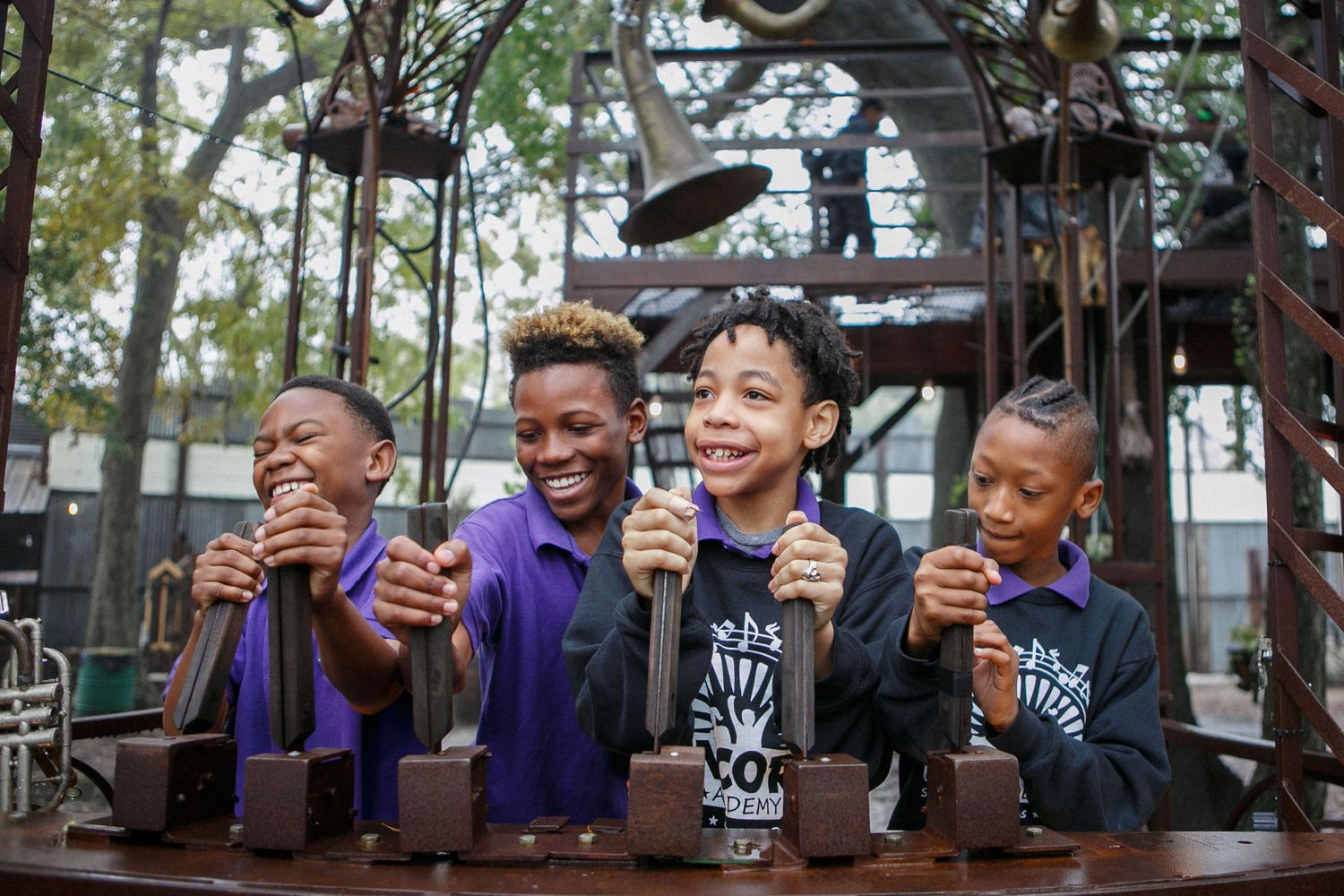
Weaving Maori Principles into an El Sistema–Inspired Program in Aotearoa, New Zealand

Tenth anniversary celebration (the author, standing). Photo: Sistema Whangarei–Toi Akorangi.
“he aha te mea nui o te ao? Māku e kī atu, he tangata, he tangata, he tangata”
“What is the most important thing in this world? It is people, it is people, it is people.”
—Maori proverb
The world enjoys Maori culture through its vivid kapa haka (performances of song, dance, and chant) and the famous haka displayed at All Blacks rugby games. There are no piupiu, poi, or taiaha (traditional garments, food, or weapons) at Sistema Whangarei–Toi Akorangi, in New Zealand’s far north, and yet Maori principles are quietly, seamlessly woven through the fabric of our program. They create the foundations for endless possibility.

At the start of our program in 2013, our kete (basket) was nearly empty: no money, no orchestra, no space, no instruments, no process, no curriculum, and no experience. Two teachers and some teenage volunteers from Whangarei Youth Music; that was all we had—and all we needed–Maori culture gave us two treasures to build with. One was ako, a concept of teaching and learning that stresses reciprocity. The other was tuakana-teina, which connotes the relationship between an older and a younger sibling.
Ako and tuakana-teina are principles that Maori communities hold dear. They are so widely and naturally taught that for our young people, they come easily, like walking or breathing. Ako holds that each of us can be simultaneously teacher and learner. A tuakana–teina relationship takes these values further by encouraging students to teach and learn from each other. With training and guidance, tuakana stay near teina and support their learning. In orchestra, they are the hands and feet of the teaching artist at the front of the room, and they model the learning with enthusiasm. Their purpose is to encourage, guide, and celebrate with the teina.
The result is a fluid interchange of learning and support. Tuakana grow strong in empathy; they find their place in the world and know that they belong. Teina gain confidence, take safe risks, and find their place of belonging, too. This relationship has led to the creation of the Sistema Whangarei–Toi Akorangi Framework for Interdependent Learning—a living document that guides instrumental learning, musicianship, and affective learning.
Maori culture is rich with rituals, many of which are enacted on the marae (meeting place). These rituals reflect and reinforce safe belonging, mutual respect, and care for the environment. Protocols for the marae start with a powhiri, a welcoming ceremony that includes a call to convene (karanga), a conversation of possibility (korero), and a meal together. Food plays an important role in Maori culture: meeting around food creates a context of shared safety and care.
Sistema Whangarei–Toi Akorangi harnesses the power of these rituals to create a context of safety and belonging within our program. We begin each of our sessions with a calling song; as soon as children hear just one or two notes, they come running, ready to learn together. Once everyone is together, we make a circle and sing hello. (Greetings are essential in the powhiri context.) Then, the leader in the space opens a conversation of possibility, reflecting the powhiri practice. This ritual reminds everyone that it’s possible for us all to belong and that we all are responsible for the wellbeing of the whole. We then sing a karakia (prayer) for the food before we share it together.

Another song then leads the students back into the gathering space for songs and games, sharing breath and movement together, before moving to group sessions. For Maori, songs (waiata) are treasures—to be shared at the marae, in the home, and on the playground. Singing together engages a vivid sense of pride, purpose, and belonging.
Before students begin their orchestra session, they are invited to make two important agreements. The first is to agree to treat everything and everyone as taonga (treasure), and the second is to take responsibility for learning. These agreements relate to our “mindfulness” toolbox, which supports both learning and the mindsets of care, responsibility, and possibility—values clearly seen in Maori culture.
Recently, we’ve completed a project with composers helping us to arrange some waiata (songs) for orchestra. The arrangements are performed as part of our New Years celebrations and are kept as part of our repertoire. This project had multiple purposes: first, we wanted to honor the waiata themselves. Also, we wanted to explore its importance for students. We had noticed that, as a general rule, young women are powerful leaders in kapa haka; but, when it comes to school, they often want to hide. In Sistema, however, young women very quickly grow in confidence. They perform for vast audiences, leading the waiata with heads held high, radiating a beautiful confidence.
When you walk into Sistema Whangarei–Toi Akorangi, you probably won’t see a haka, or be welcomed by a powhiri, unless you’re very lucky. However, you’ll certainly feel welcome. And you will witness a community of young people who know that they belong in the whanau (family) that is Sistema Whangarei–Toi Akorangi. Slowly, we strengthen our cultural bonds. Every day, we feel grateful for the taonga—the treasures—we receive.
Related Content
All Regions, Community Building, Editorials, Gather Together, Opinion, Perspectives & Collective Action, Professional Development, Program Design, Student Voice & Leadership, Teaching & Learning, the ensemble
EDITORIAL
Musical Benchmarks Build Equity
Patrick Scafidi
All Regions, Collaborations, Community Building, Events/Performances, Gather Together, News and Resources, North America, Professional Development
New ESUSA Opportunities & Events
Patrick Scafidi
Collaborations, Community Building, Europe, Events/Performances, Funding & Support, Gather Together, Middle East, News and Resources, Professional Development
Funding Opportunity for Arab Artists Based in Europe
Patrick Scafidi
Collaborations, Community Building, Featured, Gather Together, New Orleans, North America, Perspectives & Collective Action, Student Voice & Leadership

The Importance of Free Play in Music Education
Patrick Scafidi


